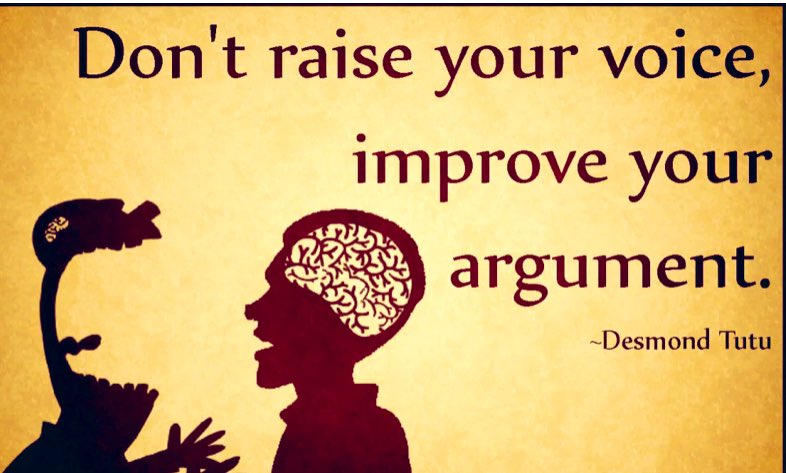Arguing thoughtfully can be a better choice than using aggressive language or actions. It requires skills and strategies to help you communicate your ideas and beliefs.
It’s essential to be friendly and respectful to win an argument, as it enables you to gain the trust and attention of your audience.
The power dynamics between people in the argument are fundamental in deciding how compelling the argument will be.
If power is evenly matched or you can change the balance by controlling resources, skills, knowledge, and problem-solving abilities, then arguing can effectively communicate. A good connection and support from the people you communicate with is also essential.
Various argument strategies can help you make your point effectively:
Various argument strategies can help you make your point effectively:
Generalization:
In arguments, people sometimes make broad statements about a group based on only a few examples. This can help to make a point, but it’s important to remember that this approach has limitations. Overgeneralizing can result in accurate conclusions and strengthen the argument.
Sign:
A sign supports a claim with evidence. It can be a fact, statistic, or expert opinion. Signs can strengthen an argument, but ensuring they are believable and relevant is essential.
Cause:
Cause-and-effect arguments explain why something happened. This method can help make a point. Still, it is essential to ensure that the cause-and-effect relationship is accurate and well-supported.
Authority:
Remember to use experts or reliable sources to support your claim. This can help convince your audience, but make sure the authority you cite is credible and relevant to your argument.
Principle:
A principle is a fundamental truth or law that guides behavior and decision-making. Principles can be effective in making a point, but it is essential to ensure that they are relevant and applicable to the argument.
The Issue about the Issue:
When arguing, it’s essential to address the main problem and the related issues that contribute to it. Understanding the situation can give a better, more detailed understanding and help develop a more effective solution.
Nature:
Understanding the nature of an issue is essential in discussions. It helps provide context and insights into the problem and find a solution. Nature refers to something’s inherent characteristics or qualities.
Origin:
Understanding where something comes from can help us determine why it’s a problem and how to fix it. For example, knowing the origin of an argument can give us insights into why the problem exists and help us address it.
Priority:
It’s important to consider what matters most to everyone involved in a dispute. This means finding solutions that deal with the most urgent concerns.
Definition:
Defining terms and concepts is essential for a good argument. Clear definitions ensure everyone understands and reduce misunderstandings.
Assumptions:
Remember that assumptions are beliefs or ideas taken for granted in an argument. Identifying and examining these assumptions is essential to ensure they are valid and do not affect the conclusion.
Fact:
Remember: Facts are objective, checkable information. When arguing, it’s important to use facts to support your words and to watch out for wrong information or mistakes.
Value:
Understanding values is crucial in finding solutions during arguments. It’s essential to know the beliefs of all parties involved. Values are the basic principles or beliefs of an individual or group.
Relevance:
In argumentation, it’s essential to ensure that the arguments and evidence used are relevant to the problem and help to advance the discussion. Relevance refers to the connection or relationship between the argument and the issue.
Significance:
Significance refers to the importance or worth of something. In argumentation, it’s essential to consider the relevance of the issue and the potential consequences of different solutions.
Implications:
When arguing, it’s essential to think about the possible effects of different solutions and carefully consider the advantages and disadvantages of each option. These effects are called implications.
Setting:
Understanding the setting can provide valuable context and help tailor the argument to the audience. Setting refers to the context or environment in which the argument occurs.
Process/Procedure:
The process or procedure is the steps or methods used to solve a problem. In arguments, it’s essential to clearly outline the process or procedure used to conclude to ensure transparency and credibility.
Judges/Expertise:
Judges or experts are knowledgeable or experienced individuals in a specific field. When evaluating an argument’s credibility and validity, it’s essential to consider the expertise of judges or experts in the field.
Clarifying Differences in Assumptions:
It’s essential to clearly state differences in assumptions when arguing to make sure everyone sees the issue from the same point of view. This can reduce misunderstandings and move the discussion forward.
To make your argument strong, you must know the facts and supporting sources, clarify differences in assumptions, and have confidence in prevailing over your opponent.
Instead of attacking their reality, you should offer them a better perception of reality, listen to them, reflect on it, and let them think about their argument.
In intellectual discussions, it’s important to avoid attacking the person instead of their argument, conflicting beliefs or actions, and deviating from the topic.
Be aware of where your opponent is deviating from ad rem and utilize the following strategies:
- Extend – Taking the argument involves connecting it to other ideas or concepts.
- Minimize – Downplaying the argument’s significance makes it less convincing.
- Turn the tables – Use your opponent’s values, goals, and qualities to your advantage.
- Generalise – Drawing a broad conclusion based on limited evidence or examples.
- Divert – This means changing the subject or person and using relevance, setting, and significance as reasons.
- Convert terms – This means using different words to explain an idea or concept.
- Show inconsistencies in beliefs, statements, actions, or interests – This entails identifying inconsistencies in your opponent’s beliefs, statements, actions, or interests. The goal is to influence the audience’s perception of their character and reliability and reduce their motivation.
- Conclude – Concluding involves evaluating the evidence and arguments presented.
- Categories – Twisting your opponent’s words to make their argument look bad is what this is all about.
- Appeal to authority – Use reliable sources or experts to support your argument.
- Good in theory – The argument is theoretically sound but may not work in practice.
Conclusion:
If done right, arguing can be a better choice than physical violence. Understanding the power dynamic, developing argument strategies, and avoiding argument fallacies are essential for effectively winning an argument.




